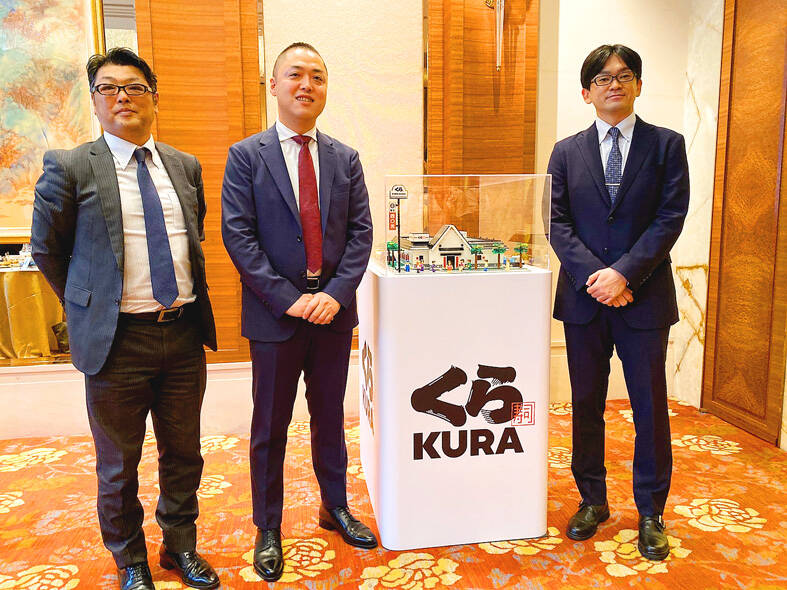Kura Sushi Asia Co (亞洲藏壽司), a Taiwanese subsidiary of Japanese sushi chain Kura Sushi Inc, yesterday saw its stock dive by the daily limit after posting lackluster fourth-quarter results.
Shares of Kura Sushi Asia closed down 9.83 percent to NT$183.50, after the company on Thursday reported modest earnings of NT$1.16 per share for the October-to-December period on revenue of NT$1.02 billion (US$33.07 million), its second-highest on record, Taiwan Stock Exchange data showed.
Earnings were affected by foreign-exchange losses, as the Japanese yen’s rebound prompted investors to cut their holdings in the sushi chain, analysts said.

Photo: Amy Yang, Taipei Times
Still, net income for the full year gained nearly 10 percent to a record NT$240.09 million, or earnings of NT$5.21 per share, company data showed, as the restaurant chain benefited from consumption after the government eased COVID-19 restrictions and people grew less afraid of contracting the virus.
The phenomenon explained why revenue for last year surged 52.26 percent to NT$3.85 billion, it said.
Kura Sushi Asia operates 50 restaurants across Taiwan, mostly in conveniently located shopping malls and department stores that feature Japanese sushi, pasta, desserts, drinks and other products. The company also markets its products worldwide.
Revenue last month jumped 18.74 percent year-on-year to NT$320 million, helped by the long 228 Memorial Day holiday, the company said.
Cumulative sales for the first two months rose nearly 40 percent to NT$838 million, it added.
Kura Sushi Asia said it plans to open a new outlet in Kaohsiung after meeting its goal of operating 50 stores in Taiwan.
The company’s board yesterday approved a plan to invest 30 million yuan (US$4.3 million) in China later this year.
There is no leading conveyor belt sushi bar brand in the Chinese market, which is favorable to Kura Sushi’s plan to expand across the Strait, the company said.
The company will slow down its pace of expansion in Taiwan, which is to serve as the springboard for its ventures into China and Southeast Asia, it said.
Shanghai will be the next focus of revenue growth, aided by Kura Sushi being one of Japan’s top three sushi operators, with more than 400 outlets in the North Asian country, it said.
In other news, Kaohsiung-based Hi-Lai Foods Co (漢來美食) said it is to step up efforts to stimulate sales after revenue last month weakened 37.33 percent from January to NT$365 million, as the holiday effect faded.
The restaurant chain said it is to offer assorted discounts and promotion campaigns to woo customers.

Nvidia Corp chief executive officer Jensen Huang (黃仁勳) on Monday introduced the company’s latest supercomputer platform, featuring six new chips made by Taiwan Semiconductor Manufacturing Co (TSMC, 台積電), saying that it is now “in full production.” “If Vera Rubin is going to be in time for this year, it must be in production by now, and so, today I can tell you that Vera Rubin is in full production,” Huang said during his keynote speech at CES in Las Vegas. The rollout of six concurrent chips for Vera Rubin — the company’s next-generation artificial intelligence (AI) computing platform — marks a strategic

Enhanced tax credits that have helped reduce the cost of health insurance for the vast majority of US Affordable Care Act enrollees expired on Jan.1, cementing higher health costs for millions of Americans at the start of the new year. Democrats forced a 43-day US government shutdown over the issue. Moderate Republicans called for a solution to save their political aspirations this year. US President Donald Trump floated a way out, only to back off after conservative backlash. In the end, no one’s efforts were enough to save the subsidies before their expiration date. A US House of Representatives vote

REVENUE PERFORMANCE: Cloud and network products, and electronic components saw strong increases, while smart consumer electronics and computing products fell Hon Hai Precision Industry Co (鴻海精密) yesterday posted 26.51 percent quarterly growth in revenue for last quarter to NT$2.6 trillion (US$82.44 billion), the strongest on record for the period and above expectations, but the company forecast a slight revenue dip this quarter due to seasonal factors. On an annual basis, revenue last quarter grew 22.07 percent, the company said. Analysts on average estimated about NT$2.4 trillion increase. Hon Hai, which assembles servers for Nvidia Corp and iPhones for Apple Inc, is expanding its capacity in the US, adding artificial intelligence (AI) server production in Wisconsin and Texas, where it operates established campuses. This

US President Donald Trump on Friday blocked US photonics firm HieFo Corp’s US$3 million acquisition of assets in New Jersey-based aerospace and defense specialist Emcore Corp, citing national security and China-related concerns. In an order released by the White House, Trump said HieFo was “controlled by a citizen of the People’s Republic of China” and that its 2024 acquisition of Emcore’s businesses led the US president to believe that it might “take action that threatens to impair the national security of the United States.” The order did not name the person or detail Trump’s concerns. “The Transaction is hereby prohibited,”